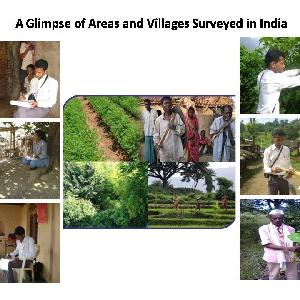
Exploring hidden potentials of wild edible plants by SAVITA, KUNDA, VINOD
 Rajendra Patil Jun 9, 2016 01:01 | Wild edible plants posses high nutritional values. Knowledge on wild edible plants is remained restricted to tibial. Hence such kind of projects needs to be taken up on priority so that its potential and nutritional values can be estimated scientifically. Foods/dishes prepared from it can become part of routine diets. |
 Madhura J Jun 9, 2016 03:40 | I support this proposal very much because in my opinion if we could able to use unused land for cultivation of Wild edible plants so that it will not only helpful for biodiversity conservation but also it will be turned as a income source for rural community. |
 Pallavi Joshi Jun 9, 2016 03:34 | i like this project, if it is implemented it will give variety of nutritious food in future when there is a shortage of food because of drastic climate change and global warming. |
 Vidya Gupta Jun 9, 2016 09:38 | Wild edible plants to be used as nutritional source is a novel approach. Not explored much. Suitable for Indian context. Well written and thought proposal. |
 Jaywant Pawar Jun 10, 2016 02:34 | Good Food Good Life |
 Smita Salve Jun 11, 2016 05:16 | I feel this is the excellent source which is available in nature to secure the future nutrition demand. |
 Shamali Thakare Jun 11, 2016 11:11 |
|
 Sayali Borse Jun 12, 2016 03:52 | Good project if this is implemented we can get good food with more nutritional value.By this project wild plants can get conserve too. Good Luck! |
 Pankaj Wakchoure Jun 12, 2016 05:12 | "Wild edible plants", most of us haven't come across this term after school days. Nutritious food: I do prefer Nutritious food from the Supermarkets, keeping in mind that I am not going to get a high amount of nutrition due to heavy usage of pesticides, plants cultivated in a volatile climate and unsuitable soil & bad storage. I Appreciate the analysis & solution mentioned in this paper, as I believe this can address the issues mentioned above related to nutritious food. If I am not wrong, "Wild edible plants" can be cultivated in all types of soil, climate and in less water (suitable for countries having water crisis), because here in UK type of soil & climate changes approximately in every 200 miles. Pollution: Wish you all healthy life but all types of pollution are rising at an alarming rate in all world cities, resulting in a challenge to have a disease free & healthy life. An average age of “CITY” citizen has been decreased by 2-3 years. http://www.scientificamerican.com/article/air-pollution-linked-to-health/ http://www.who.int/mediacentre/factsheets/fs313/en/ In last 2 decades, there is a significant hike in patients affected by Hypoxia, Hypoxemia & asthma. It would be a value addition if the same solution "Wild edible plants" can help in controlling carbon dioxide and provide fresh oxygen & I believe it does, right? Insect repellent: @ SAVITA, KUNDA, VINOD: Are these ‘Wild edible plants’ efficient to repel unwanted insects like mosquitos? If yes, then it could be the valid possible solution for many of the countries in Africa & Asia, which are heavily suffering from Malaria transmission. http://www.rollbackmalaria.org/countries/endemic-countries-1 Ease: It is my understanding that these plants can be cultivated in normal plant pots and don’t need any special, extra care or maintenance, correct? @ SAVITA, KUNDA, VINOD: Good work on this research, well done! Appreciate your efforts, you get my vote! |
 Kailas Patil Jun 13, 2016 12:43 | I support this proposal very much |
 Nikhil Borse Jun 13, 2016 12:08 | This could revolutionize the dietary industry. Could bring some new nutrients previous available only in some selected foods in our daily diet. |
 Anil Bhamare Jun 13, 2016 02:59 | I feel this is the excellent source which is available in nature to secure the future nutrition demand. |
 Nilesh Chopade Jun 13, 2016 02:35 | Good work on this research, well done! Appreciate your efforts, you get my vote! |
 Vinod Ragade Jun 13, 2016 02:43 | North Maharashtra the place located in India and I feel proud of Dr Savita & team belong this place, and the reason Dr Savita very well known about this location and I think she inspire for research because of in this belt many farmers goes by modern techniques but we also need to more and more farmers goes to this way and the need of healthy & wealthy food and the need for clean climate its a Demand for us. And I think this is the next step goes to this way.... Thanks & Cheers to this team, My full of support & I wish this team win the contest.
|
 Prashant Kawar Jun 13, 2016 03:15 | I appreciate the proposal due to its new concept “Edible Wild plants: A unexplored wealth to mitigate malnutrition and hunger. Which is really our ancient wealth but now forgotten due to lack of awareness and knowlwdge. Now a days we are seeing most of food crops are grown with heavy use of chemical fertilizers and pesticides which are making us unhealthy and diseases prone. Even we see reduced resistance to many deadly diseases (Cancer and others). Even due to high pollution and residual effects of pesticides in our present day foods the average age in most of developing and developed countries has come down by 2-3 years. Hence this kind of project is need of present time. This proposal addresses the food security issues in developing countries of Asia & Africa at the same time this less known and used foods and can be grown on all types of soils having less infestation from insect (High level of resistance to insect pests) and at same time new crops with novel tests with high nutritive value will be available for routine cultivation ultimately solving in part the problem of hunger in highly populated countries where number of children are dying due to malnutrition and even due to hunger. Hence I strongly support this proposal for final contest. My best wishes to authors of this proposal. |
 Prashant Kawar Jun 13, 2016 03:18 | I appreciate the proposal due to its new concept “Edible Wild plants: A unexplored wealth to mitigate malnutrition and hunger. Which is really our ancient wealth but now forgotten due to lack of awareness and knowlwdge. Now a days we are seeing most of food crops are grown with heavy use of chemical fertilizers and pesticides which are making us unhealthy and diseases prone. Even we see reduced resistance to many deadly diseases (Cancer and others). Even due to high pollution and residual effects of pesticides in our present day foods the average age in most of developing and developed countries has come down by 2-3 years. Hence this kind of project is need of present time. This proposal addresses the food security issues in developing countries of Asia & Africa at the same time this less known and used foods and can be grown on all types of soils having less infestation from insect (High level of resistance to insect pests) and at same time new crops with novel tests with high nutritive value will be available for routine cultivation ultimately solving in part the problem of hunger in highly populated countries where number of children are dying due to malnutrition and even due to hunger. Hence I strongly support this proposal for final contest. My best wishes to authors of this proposal. |
 Gulab Khambayat Jun 13, 2016 03:13 | West land be used to create more forest which will be more useful for the betterment of mankind. To reduce the bad beffects of climate change and also for cultivation. It can also be used for cultivating edible plants for animals. I strongly support Dr.Savita and her team and there efforts of research and use of modern technology that will help to improve the situation of Indian farmers.
|
 Shashikant Nahire Jun 13, 2016 03:04 | Exploring the nutritional value in new plants is always beneficial for the mankind especially when food security is required for growing population. In India, ayurveda has identified medicinal value in many plants which are now commonly cultivated for medicinal use. Plenty of wild plants are still to be understood from their nutritional importance and also health benefit point of view. The current proposal is certainly unique to tap importance of such new plants and hence worthwhile to study in detail. Strongly support as it is relevant to the necessity of the time. |
 T Saha Jun 13, 2016 03:30 | Excellent idea. We all support your endeavour. Really it is enexplored, untapped with huge potential.
|
 Madhuri Pagariya Jun 13, 2016 03:55 | I support the proposal due to its novel concept “Edible Wild plants: A hidden treasure to alleviate underfeeding and starvation” a genuine nutritive alternative available in nature and given by nature itself but unexplored due lack knowledge only. This project will provide information on unexplored wild edible plants to feed the world’s increasing population. I am sure this wild wealth can be a vital source to provide nutrients which are lacking in present day foods due to heavy use of chemical fertilizers and insecticides. The information generated in this project will strengthen the present drive of organic farming in most of the developing countries and will support to alleviate malnutrition problem in children by providing the healthy and nutritious food. Hence I strongly support this proposal for final contest and my best wishes to the authors. |
 Ravindra Haval Jun 13, 2016 03:50 | I like this project |
 Sunil Mhatre Jun 13, 2016 04:04 | I am glad to see my countryman participating in research on climate change and use of land. As an Indian I support Dr.Savita and her team for the final...
|
 Monika Newase Jun 13, 2016 04:08 | Wild edible plants (WEPs) are widely consumed in the daily diet of the local people. WEPs are critical for the sustenance of ethnic communities and also as a source of income. Super Idea. |
 Yogesh Pawar Jun 13, 2016 04:36 | Primitive knowledge is going to get new touch and scientific background through such kind of project. I strongly support this project which is very much need of today |
 Nitin Pawar Jun 13, 2016 04:36 | Nicely written project. Authors needs to address how this project will help in poverty alleviation in tribal areas. Tribals are out of main stream even after 68 years of independence. i strongly support the project which is going to work closely with tribal |
 Vikas Mahajan Jun 13, 2016 06:37 | There are many possibilities to save planet earth, This article is an example of same. good research and well written. |
 Girish Tawate Jun 13, 2016 08:36 | It is very useful project as per as common man concern |
 Vikram Ghole Jun 13, 2016 12:52 | I support this idea and work must be carried out in this area. To explore non-convectional edible plants one must work with tribal people ( as they have vast experience of the plant and their usage) and also long term and complete toxicological study be carried out before making any nonconventional plant available for the consumption for public. |
 Mukesh Kumar Varshney Jun 14, 2016 12:38 | I strongly endorse this project mainly because research project focus towards conservation of biodiversity of wild plants, development of agro-techniques to make wild cultivable, empowerment in tribal areas, economic support to tribal and providing alternative foods that are not part of routine diets. Since wild type plants can be grown on any kind of soil and climate, its widespread cultivation is possible in India and Asian countries provided it is profitable to grow. Good luck to team!
|
 Sanjaykumar Suryawanshi Jun 14, 2016 01:39 | Topic is very nice which may useful for upcoming generation to improve nutritional status at very low cost. |
 Ravindra Kale Jun 14, 2016 02:55 | I am really happy with such proposal. if we see there are only few major food crops that cover maximum population of world. if any major disease affect food crops like rice or wheat and reduce production more than 50% it is very difficult to survive. As these crops also derived from weeds to cultivable crops during domestication it is possible to search such new wild species and cultivate them so there will be an alternative for existing crops. also it is helpful to maintain biodiversity. |
 Narendra Kadoo Jun 14, 2016 02:56 | The proposal is very well-written and when executed as per the plan, will have a significant impact on the biodiversity of the region, environmental conservation, CO2 sequestration, conservation of water as well as benefiting the locals and farming community. Moreover, it will provide highly nutritive diets to the general public, by marketing the products. Hence, I strongly support the project and feel confident that the project objectives will be fully met. I congratulate the authors for developing such a well-thought project and wish success for its implementation. |
 Neha Thakre Jun 14, 2016 05:18 | This proposal is very unique and it would provide a great opportunity to researchers of interdisciplinary learning. Also this project would be the indigenous attempt towards updating the biodiversity of wild edible plants available in India. India is known to be agricultural country yet faces food scarcity, such projects would be the great solution. This project would empower employment , economy and intellect of country. I congratulate the authors for such a well thought and well written proposal and strongly support for the implementation of project. |
 Manasi Telang Jun 14, 2016 05:54 | Wild edible plants might offer health benefits. Best part is the returns from the project would multiply after its completion! |
 Sadhana Deshmukh Jun 14, 2016 06:05 |
|
 Priyanka Ghongane Jun 14, 2016 11:12 | Excellent! I support this proposal. Well done. |
 Mahendra Wagh Jun 14, 2016 12:09 | Excellence article. |
 Vivek Khare Jun 14, 2016 01:13 | this is a very valuable research topic. i support this research..
|
 Smita Kadoo Jun 14, 2016 09:09 | Nice project on a topic needing urgent attention. This project is promising and can go in a long way to improve the ecosystem, conserve biodiversity, provide incomes to the locals and nutritive food to the general public. |
 Pankaj Patil Jun 15, 2016 12:49 | I support this proposal very much because in my opinion if we could able to use unused land for cultivation of Wild edible plants so that it will not only helpful for biodiversity conservation but also it will be turned as a income source for rural community. |
 Pankaj Patil Jun 15, 2016 12:51 | I support this proposal very much because in my opinion if we could able to use unused land for cultivation of Wild edible plants so that it will not only helpful for biodiversity conservation but also it will be turned as a income source for rural community. |
 Madhur Josh Jun 15, 2016 02:14 | The concept is very great! It is todays need. Wild edible plants to be used as nutritional source. All d best. |
 Vinay Nandre Jun 15, 2016 04:50 | Its really good research. |
 Milind Somvanshi Jun 15, 2016 05:31 | I am from IT background but You explained very clearly to helpful me to understand your idea.
|
 Milind Somvanshi Jun 15, 2016 05:39 | I am from IT background but You explained very clearly to helpful me to understand your idea.
|
 Anita Khambayat Jun 16, 2016 08:47 | This subject is rightly selected by Dr.Savita and her team. Wild edible plants are need of the hour. The research on this subject is very challenging and I am sure Dr.Savita will proven that Indian women is well capable of dealing with any subject which is going to help every human being. This would provide a great opportunity to researchers to go dipper in the subject and invent something new. This project the indigenous attempt towards updating the biodiversity of wild edible plants available in India. India is land of farmers agricultural is the backbone of our economy. I wish all the success to Dr.Savita & Co. |
 Naresh Patil Jun 17, 2016 05:23 | I support this new research... |
 Aneel Birajdar Jun 17, 2016 07:05 | I am really appericiated with this project.It is the need of the day bcoz whatever we are taking foods which is least nutrititious.We are getting nothing from present hybrids but instead of them we are taking nutrition through tablets & capsules.Now the trend is changing like eat for live.Nobody is getting nutrition resulted in reduce the resistant power.I am working with Nirmal seeds Pachora & have started the programme for biofortification in Rice,Bajara,Maize,Mustard & almost vegetable crops on priority basis.Time has came to think that regarding biodiversity.Breeders cant do anything without genetic variability & those wild species /relatives having most desirable genes should bring in cultivated species for commercial cultivation.Tree plantation is a feasible solution for lower down the CO2 conc.SO,"BREEDING TODAY FOR BETTER TOMMOROW"THANKS & REGARDS;ANEEL BIRAJDAREMERGING SCIENTIST IN NIRMAL SEEDS PACHORA. |
 Yogesh Khokale Jun 17, 2016 09:27 | I have supporting to this proposal very much. This study is good against the increasing demond of food, this is the best way to fulfiling the populations food need. Once again thanx |
 Yogesh Kshirsagar Jun 18, 2016 06:32 | Wild edible plants are very nutritious. Some wild plants are also toxic, hence detailed scientific study is required to use those wild plants as a food. This proposal is good initiative towards scientific study of wild edible plants. I strongly recommend this proposal for finalist winner. |
 Satish Pawar Jun 18, 2016 10:11 | Excellent Article........ |
 Sanjay Auti Jun 21, 2016 01:38 | Submitted proposal on wild edible plant is really important from nutritional security point of view. Conservation of ignored edible plants will help to maintain sustainable development. Along with modern tools or technologies, exploration of nature for valuable resources are important. Project will motivate people to explore hidden natural resources.
|
 Deepti Deshpande Jun 22, 2016 01:54 | Nasik, India, known as grape city which comes under western ghats and it is rich in biodiversity, includes many wild edible plant species. Various tribal communities are found using these wild edible plants as their food and medicine. The urban communities in this area are not much aware about the importance of wild edible plants and even researchers have not paid much attention on this subject. Our institute SMRK-BK-AK Mahila Mahavidyalaya (Women's college), Nasik has decided to work in this direction. Our faculty member Dr. Savita Borse took the initiative and started work in collaboration with department of forest, Govt. of India. Savita and her team explored the tribal knowledge in small area around Nasik through survey. The experimental work for analysis of nutritional and anti nutritional components from wild edible plants was conducted in our laboratory and other research organizations. Also the recipes were developed for some of the wild edible plants by nutritionist. The small steps taken by the author team in exploring nature's wealth is well appreciated as it will be helpful to face the global challenges in future. In my opinion this is the novel approach to meet the nutritional demand of growing population, conservation of local biodiversity, increasing employability and the uplift of economy. Initial results obtained by authors are encouraging and much more needs to be done. Project submitted to the Climate Co Lab is the right step to reveal the potential of wild edible plants. MIT is the right platform to investigate on this topic thoroughly. All the very best to team. |
 Kondiram Dhumal Jun 23, 2016 09:55 | The proposal on potential of wild edible plants is highly innovative and global future of mankind. The existing food resources are diminishing in due course of time, hence the best alternative is to explore and to exploit the under utilized and highly medicinal as well as nutritional wild edible plants, which are available in abundance in the agricultural countries like India. If We have to achieve the goal of hunger free society we have to explore the naturally available wild edible resources. It is the timely thinking and approach towards such resources. In developing countries such movements will bless the poor people who are suffering from hunger and malnutrition. Not only this but even in developed nations this gift of Nature (wild edible plants) will be a boon to have healthy and nutrient rich natural food. I highly appreciate and like very much this proposal and strongly recommend the proposal's entry in final selection. |
 Mahadev Chambhare Jun 23, 2016 01:52 | with traditional knowledge the wild edible plants highly useful in day to day life. there is no any plant in the universe which is not having the medicinal property. |